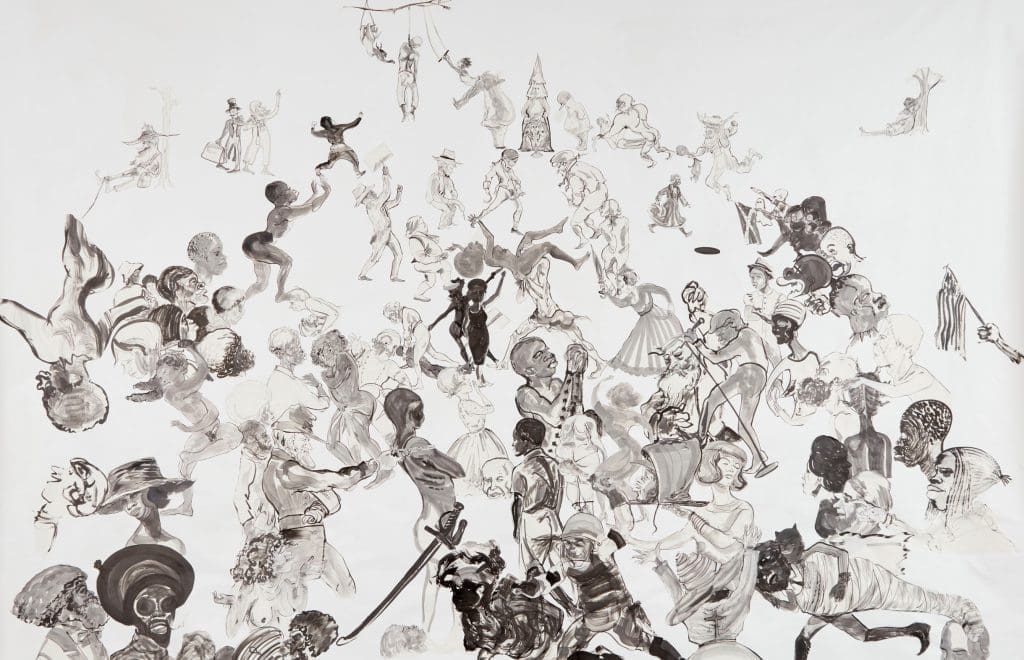AntiNote: The following is an extended excerpt of a radio interview, edited for readability.
On 19 April 2014 Chuck Mertz of This is Hell! Radio (Chicago) interviewed author, filmmaker, cultural critic and musician Astra Taylor about imagining new models for digital media that reflect truly revolutionary cultural values.
Although she does not attempt to provide specific solutions, we appreciate her impulse to work collectively on developing them and we are struck by the simple elegance of her observation that the tech ‘revolution’ has not been all that revolutionary—yet.
Frequent visitors to Antidote as well as our growing network of invaluable collaborators will already be familiar with our obsession with this issue and our own efforts at cultivating a more cooperative rather than competitive spirit in the production and dissemination of culture and information. As we emphasize repeatedly, we won’t overcome the prevailing commercial media model by imitating its most pernicious attributes (in way, we have been painfully reminded of this once again by the fall from grace of Chris Hedges. Competition, ego, position leverage, fetishizing status…need we go on?).
Astra Taylor takes us a few steps further in this thinking by identifying a few more of these attributes and inviting us to imagine, more concretely, what we would like to see in their place.
“‘Innovation,’ ‘disruption’ and ‘openness’ are all terms that can be twisted to serve business imperatives.”
Chuck Mertz: Astra Taylor is the author of The People’s Platform: Taking Back Power and Culture in the Digital Age. Good morning, Astra.
Astra Taylor: Good morning!
CM: One of the things that you stress in your book is this idea of ‘New Media’ having the same old problems as ‘Old Media.’ What are the issues that are not being addressed?
AT: There’s this idea that the internet is such a revolutionary and disruptive technology that we can finally put the challenges and the problems and disappointments of the mainstream media—old legacy media—behind us. There’s this wish that it could happen effortlessly, by technology alone; what I point out in the book is how much the story should actually be about continuity as much as change.
What kind of continuity am I talking about? I’m talking about the continuing presence of things like corporate consolidation; the continuing presence of commercialization; the fact that the digital economy is still underpinned by advertising. So old problems are still with us.
There are hierarchies from the old model that have been simply carried over. They are structural. They are economic: there are these new tech monopolies—and they are social: old hierarchies, like the dominance of wealthy white men, continue in digital spaces. Who is running the big New Media platforms? Who is running the tech companies? They’re even more male-dominated than some of the companies of yore.
So there are these continuities, and when we fall back on this revolutionary, disruptive rhetoric, we don’t treat them fairly. If we’re not seeing them clearly, then we can’t help facilitate and nurture the wonderful, truly transformative potential of this new medium.
CM: Why hasn’t the internet had the transformative power that we were hoping for? Earlier on this morning’s show, we were talking to David Cay Johnston; he has a new book out called Divided: the Perils of our Growing Inequality, and he was talking about the promises that had been made to the American public about how much broadband we were going to have, how much Wi-Fi, how quick we were going to be able to get information. Why didn’t the transformative revolution happen? Is it because our government didn’t fulfill the promises that it made about our new digital age?
AT: It comes down to money. To have these high speeds of uploading and downloading, especially in places that are not urban centers where there’s population density that can pay the cable companies for their services—if we’re talking about rural Americans or poor neighborhoods—we have to invest in infrastructure. And that’s a kind of public expenditure that we’re very reluctant to do. What the telecom companies would rather do is invest as little as possible in the wires that are necessary and instead charge us more for poorer service.
What we’re seeing is a market failure; most of us have very little or no choice over who our internet service providers are. The government has failed in that it is not making the most impactful public subsidies; the market is actively blocking that. The telecom companies have their lobbyists, and then those lobbyists go work at the FCC, and after they work at the FCC they go back and work as lobbyists, and civil society doesn’t really have a voice in these matters.
We are kept out of these discussions because people wave their hands and go, “oh, it’s technology, it’s too complicated for people to understand and weigh in on.” And we lose out. There are counterexamples: Brazil just passed very comprehensive net neutrality laws; the citizens were asked to weigh in, and have a seat at the table. That is a level of democratic participation that’s unimaginable here. Right now we have the telecom lobby dictating what kind of internet service we all get.
And we lose, because it’s more and more essential, not just for social media or downloading videos, but for education, healthcare…and more and more of our devices in the home are connected and networked. So the implications are huge.
CM: Often in America we think that a new technology will come along and fix the problem. You write a lot about this in your book, this sense of technological triumphalism in the United States. So is tech the answer? Is there a technological solution to making the internet and the new digital world more democratic?
AT: Technology is part of it. There’s no denying the fact that the infrastructure of our communications network has changed. With television, we didn’t determine what was being transmitted into our homes; we sat there and got to change a few channels; in this new context we can upload and download, and we can communicate with our communities. That is remarkable, and denying that would be just silly. But that doesn’t mean there isn’t still a paradox.
The paradox is that even as we are able to communicate more directly with friends and family and we feel that we are in charge of our media destinies, there is this backdrop of corporate surveillance and advertising and data-mining that makes the whole thing run—and it is actually intensifying, and it is unregulated. So technology is a piece of the puzzle, but it has to be balanced with policy and with people organizing and people thinking about the social and economic context that these tools are developed in.
Right now, all of these internet ‘startups’ are working within the context of the venture capitalist model, or aspiring to be gobbled up by a bigger company, or they’re already publicly traded and are therefore accountable to their shareholders. There aren’t popular platforms that have a different kind of economic accountability or model baked into them.
That’s not to deny the importance of technology, but it’s not enough. It’s just one small piece of a much bigger puzzle.
CM: How much do we misunderstand this issue because of, again, the technological triumphalism that feeds into the triumphalism of the corporations and the people who are behind the digital revolutions? Are we distracted from this issue when we glamorize and deify, when we embrace Google saying that it’s “not evil” or Steve Jobs saying that he’s a self-made genius?
“In the evolution of publishing and radio, commercialization got so out control that we devised a whole new way of funding things: public media. That didn’t just emerge naturally. People had to organize and conceptualize and think about what a non-commercial option would be.”
AT: I think that you’ve really hit the nail on the head with this. So much of the rhetoric is coming from these companies themselves. I’m quite interested in language and the ideology that underpins the language that we use, and I find it fascinating that we don’t have a progressive vocabulary for talking about the current media landscape and the kind of media and technology that we want.
Instead, we’ve imported the language of the tech companies, who praise “innovation” and “disruption” and “openness.” These are all terms, when you stop to think about it, that can be twisted to serve business imperatives.
“Innovation” is about the market generating the tools and the things that we need to make our lives better, and the idea is that the government doesn’t innovate—private companies do—even though that is a complete lie. Government investment was central to the creation of not only the internet, but also every little device. Touchscreens, you name it: public subsidies played a role.
“Disruption” is basically just a word used to justify destroying one business (and possibly destroying people’s lives), and making the cruelty of competition sound like it’s the greatest thing since sliced bread. We have completely caved and given in to their vision of a ‘better’ world. It’s very strange.
It’s strange that suddenly we have this culture where famous musicians or rock stars compare themselves to Steve Jobs—and he was a pretty brutal executive. Our culture has really lionized these guys, and they are overdue for a takedown.
CM: You write about how people somehow believe companies like Google are protecting a public space. But, you write, “they are commercial enterprises designed to maximize revenue, not defend political expression, preserve our collective heritage, or facilitate creativity. And the people who work there are private employees, not public servants.”
But we don’t want to be duped and scammed. We don’t want to believe that they are doing anything evil, because that would mean we have been duped and scammed. What are some of the things that Google has done that should make people question their genius?
AT: There are many. The “don’t be evil” policy, by the way, only applied to certain advertising; I don’t think it was meant to be a general statement of ethics across the board. But they said initially they wouldn’t track users; they do now. They recently announced that they will use your image, likeness, name, etcetera in advertisement even if you haven’t explicitly given your consent. They now connect all of the services you use and track your path across different platforms. And obviously they are bedfellows with the NSA and other government agencies. There are many ways that Google has shown that the axiom, “don’t be evil,” is a flexible one.
And even if you think that Google is a decent company now, and you like the founders of it, they’re not going to be running this company forever. The important thing is to see the trajectory the company is on; not just that it is constantly eroding users’ privacy but also that it is expanding into more and more areas of our lives. It bought Nest, which is a home appliance company, so Google will be in your thermostat. We all know that Google is working towards self-driving cars, and buying up drones ostensibly so it can provide the internet to unconnected parts of the world. When we think about the way the company is evolving, given the path that it’s already on, then things get more alarming.
But it’s quite a complicated situation; we are all dependent on these services. That is something to acknowledge. You could almost imagine someone saying, “well, if you don’t like it, don’t use it,” just like “if you want to criticize America, move.” But these platforms are monopolies, and there’s a sense in which we are compelled to participate in them. This is where people get connected for work and for school. Many of these platforms are utilities for people, the way the phone was a utility back in the day—not in terms of the way they’re regulated but in terms of the way they’re used.
So perhaps people also feel conflicted because they can’t imagine how they would survive without them. That’s why I try very hard to shift the emphasis away from the individual user to the collective, to the social. It can’t be about each of us trying to find out some means to engage with these corporate goliaths that we feel personally pure or good about.
Ultimately there needs to be robust privacy law. That’s the level at which Google needs to be reformed. It can’t just be about my personal relationship with it; it’s important to think about ways of giving civil society more of a voice in the online sphere and putting the brakes on these entities that way.
CM: So what can we do, collectively? You talk about how these companies have monopolized the system. We don’t have a choice in using a lot of these services. But you mention eBay having a different corporate structure; how would you rather companies like eBay or Facebook or Twitter would look and behave?
“It feels as though there’s this buffet of choice, but there’s actually still a consolidation of corporate power and a dearth of non-commercial options out there. The public good could be served in other ways.”
AT: I think there are other business models out there; one of the responses to these companies we could give is, “you’re so into disruption, but you never disrupt your IPO. You never disrupt Goldman Sachs or those economic structures that are ultimately dictating a lot of your behavior.” Plus there’s the whole issue of the value of these services and who creates that value. There are the workers at the company, but there are also the users creating content—us—and ultimately that’s why these platforms are valued at billions and billions of dollars.
So it’s a nice thought experiment to think about other arrangements. What would a cooperative iTunes look like? Or a cooperative Spotify? What if it weren’t these private equity guys getting thirty percent of every music transaction in the world?
But there are less pie-in-the-sky possibilities of reform. We’ve seen a few concessions in the last couple of months, for example people talking about encrypting email traffic—and that’s because of so much bad press since the Snowden revelations. There was quite a bit of good organizing going on, and there could be more. We see that there is some possibility for leveraging change.
There are encouraging things that could happen around the margins, because public opinion is shifting really dramatically. There was a poll from Reuters at the beginning of this month that said 51% of Americans think that tech companies are encroaching too much on our lives. So something is happening where users are getting nervous; they’re getting upset, they’re getting fed up. And there’s potential power in that.
The other thing I point to is the moment in the evolution of publishing and radio where commercialization got so out control that we devised a whole new way of funding things, and that was public media. That didn’t just emerge naturally in the television and radio landscape. People had to organize and conceptualize and think about what a non-commercial option would be. Perhaps we will get to a point where civil society demands something like that. We’ve been at a crossroads before where people were just fed up, and we thought about other ways of organizing.
CM: I think that the problem with public media is the assumption that public media means leftwing media. How do you get over that belief? Is there some way that we can get people to invest in public media to the degree that other industrialized nations do? Can we ever get over that hurdle, or will this always be a left-right divide?
AT: When you’re talking about these kinds of issues the hurdles always seem immense when you’re on the initial side of them. I am sure that it seemed like an immense hurdle to establish public media in this country—and it really wasn’t established until the sixties. But it’s definitely a big challenge, and you’re right: what little public media we have is being eroded because they’re looking for funding and taking it from questionable places.
But it turns out that Americans do actually approve of public media spending. It’s one of the few government expenditures that people are content with. And look at what’s happened in journalism in the digital age: newspapers have suffered mightily because advertising is much more brutally efficient online. Advertising dollars have bled from the old traditional media, newspapers etcetera—but actually public media and public radio is doing better in keeping and even growing its audience share, especially among younger people. So that’s encouraging; people’s changing listening habits could be built upon.
“One of the ironies of this moment is that in this new technologically-enhanced media sphere, we’re still dependent on the old funding structures. The “cutting edge” is surprisingly retrograde when you look beneath the hood.”
But there’s still a lot of misconception, even among American journalists; they say things like, “oh, I wouldn’t want the state involved in media production.” And one response to that is, “well, do you like public schools? The state is involved in that.” But the other thing is that even conservative outlets like The Economist have acknowledged that countries with robust financing for public media score very high on democracy indexes. And that’s because it doesn’t mean “government controlled.” It’s about funding mechanisms and sustainability.
There’s a lot of work to be done in terms of public perception, and clarifying what public media means. And then there’s this imaginative work to be done: what is public media in the digital age? We used to justify public media because there were specters of scarcity, because there were only a few channels on television. “Okay, maybe there’s ten channels, we’ll take two of them and have them serve the public good.” But on the internet, we have this idea that it’s infinite—if you don’t like something, just go to another website.
We need to provide a robust challenge to that idea, and look at how even though it feels as though there’s this buffet of choice, there’s actually still a consolidation of corporate power and a dearth of non-commercial options out there, and that the public good could be served in other ways.
CM: There’s one concept that you bring up towards the end of your book that I want to make sure that people understand, this concept of “cultural sustainability.” Tell people what cultural sustainability is.
AT: So much of the romance of the internet is encapsulated in this phrase “free culture.” And so well-meaning people have framed their interventions around copyright reform and participatory media online, in terms of a “free culture.” The idea is that on the internet we can exchange things, we can remix things, we can participate in a way that we couldn’t under the old broadcast model. I am countering that by challenging the idea that these advertiser-driven platforms actually give us culture that is “free.”
My point is that “free” things often have a cost that is not recognized. You see this with the “free” cell phones that we use to access the culture online. Your free phone has environmental costs, it’s made to be disposable so that you’ll upgrade it in nine months or a year; there are labor costs—we’ve all heard the stories about workers in Chinese factories. Your supposedly free phone has this invisible cost in it.
And culture is similar, even though it’s more immaterial. There’s a collective price that we pay. Again, advertising is really foundational to the entire digital economy. And with all these supposedly free services, we are the users, we are not the true “customers” of these services. The true customers are the advertisers who are buying our information and targeting us. And then these advertisers get to dictate what kind of culture they’re going to invest in—which makes our culture less risk-taking, more cloying.
Basically “free culture” leads to a culture where the business model is surveillance, and there are all of these costs associated with it. So “sustainable culture” is a rebuttal to that model, which is really inefficient, socially destructive, and retrograde. Advertising was the television business model. Let’s think of something new.
Sustainable culture has two main prongs. One is paying for things; paying directly instead of paying in this roundabout, inefficient way through advertising. And the second prong is public intervention and looking at the possibility of public funding to provide the cultural goods that we want and need.
One point I make is that advertising is a private tax; we spend somewhere between 500 and 800 billion dollars a year on it. We as citizens pay that money, because it’s built into the cost of the goods we buy. Why couldn’t some of that be spent in a more efficient and economical manner to support things directly? I think it’s a failure of the imagination.
One of the ironies of this moment is that in this new technologically-enhanced media sphere, we’re still dependent on the old funding structures, and that the “cutting edge” is surprisingly retrograde when you look beneath the hood. I’d love us to think of another way of sustaining the cultural sphere.
CM: One last question for you, Astra, and it’s our Question from Hell: the question we might hate to ask, you might hate to answer, or our audience is going to hate your response. You write, “the not-for-profit, donor-supported, volunteer-produced Wikipedia is often held up as the archetypal organization of an Information Age.”
That is definitely the archetypal image. Maybe that’s the way everything should be funded on the internet, if you want it democratic. Why can’t the entire internet just be Wikipedia?
AT: Wikipedia is having funding problems, or it wouldn’t have these funding drives. And they’ve actually looked at advertising as a potential revenue source. So we can’t be Wikipedia because it’s difficult to generate enough revenue to sustain oneself that way.
There are different aspects of this. One is that as a creator I’m totally supportive of Kickstarter and Indygogo and soliciting donations from viewers and users directly. But as a citizen I would like another model to exist.
As an individual, it’s nice and satisfying to be able to give to the things that I like, but as a citizen I need there to be something much broader, to make sure that things are being supported that I personally can’t see from my little vantage point on the internet. It can’t be my full-time job to make sure that everybody gets a bit of the money that’s in my wallet. I want somebody to be covering prison justice. I want people to be watching the NSA. I want someone to be on the beat about education. Trying to support all of these causes through micro-donations would be a full-time job.
I want there to be institutions out there doing that work so that I don’t have to be frantically paying attention to every aspect. That’s why we need something in addition to the Kickstarter model. We need a social compact that addresses these concerns. That’s why I try to underscore this idea that crowdfunding as a panacea doesn’t get us where we need to go. We need to think bigger.
And Kickstarter has other biases built into it. It’s easier to do a fundraising campaign if you’re a big and celebrated entity with a big mailing list and lots of people you can hit up. There’s an asymmetry there that I think we need to address, too, and we’re seeing bigger and bigger artists and moviemakers get in on the Kickstarter game, and it’s less the space of innocence and independent creators that it once was. I think it’s great, but it doesn’t go all the way.
CM: Astra Taylor has been our guest this morning. Next time Neutral Milk Hotel is in Chicago please tell me so I can go bug you.
AT: Okay, it’s going to be in July, so you’ll hear from me.
CM: Alright, sweet! I’ll bug you! Have a good weekend.
AT: Thank you, man!
Transcribed and printed with permission. Listen to the full interview right here!
Featured image source: Beehive Design Collective





